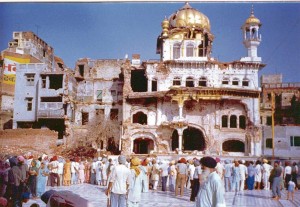Articles/Opinion
OP-ED: The loneliness of Sikhs – by Avtar Singh
February 17, 2014 | By Avtar Singh
1984 become one of the important and dreadful year of modern Sikh historical calendar. The scars of two massacres of that year still haunt the sole of Sikhs. Every day Sikhs feel the pricks of the authoritarianism of Indian democracy. The wounds of that era are still simmering in one way or the other. Although Indian state is trying its best to put the historical aspects and facts of that tragic year under carpet but those events themselves are strong enough to die down.
With the revelation of British role in 1984 massacre of Sikhs this issue is again highlighted and debated worldwide in global media. British government denied any direct role in events of 1984. British foreign secretary William Hague told parliament in London that the advice was “purely advisory” and given months in advance of the Operation Bluestar. Hague said an “unnamed British military adviser” sent to India in February 1984 recommended that any attack should be a last resort. The same adviser suggested using an element of surprise, as well as helicopters, to try to keep casualty numbers low, but no equipment or training were offered.
Hague said the Indian plan “changed significantly” in the following three months as a considerably large dissident force had built extensive fortifications on the temple complex.
With these brief comments British government tried to pacify the Sikhs. But Sikhs are feeling let down by British government. They were not expecting a petty political statement which was drafted according to the wishes of their Indian counterparts. Sikhs feel that the recent revelations illustrate the deep engagement of the British state in the events which unfolded in June 1984 and afterwards. This exercise shows that British have lot to hide than to reveal, that its role during 1984 was not limited to ‘an advice’ only. There is lot more hidden in the secret files of British military intelligence which they declare are destroyed.
The massacre of 1984 was not the isolated incident of Indian history. It was the part of huge political pattern which started to unfold in late 50’s. Indira Gandhi in her urgent quest to subvert the nuisance of parliamentary democracy and to establish a strong nation state chose the path of confrontation with Sikhs. 1984 was the climax of that confrontation.
Amit Chaudhari in one of his article in The Guardian seriously noted the ailing mentality of Indira Gandhi and Indian state, he said, ‘The Sikhs were punished during a time when the nation mutated from being governed by a single strangulating dispensation towards a fragmenting of power. That Kashmiris continue to be punished is a reminder that the process is hardly over. That the Sikhs bounced back in the 90s is as relevant to the narrative of India’s evolution at that time as any other story. But it cannot be ascribed to the “miracle” that is India – a miracle that ensures that its nastiness, in the end, just goes away (a powerful faith nurtured during globalisation that Perry Anderson, elsewhere, has tartly called “the Indian ideology”).
But Sikhs’ story is not over with the exposure of British involvement. Now news of collaboration of some Sikh leaders with Indian state in this matter are also emerging. Some letters published in Indian media and statements of some senior congress leaders including Captain Amrinder Singh suggests that senior Akali leaders have persuaded Indian state to attack Golden Temple.
The reality is that the episode of 1984 is highly secret and complicated in political and military terms. Indian state and some Akali leaders have digested the truth of those dreadful days of Sikh history. Both parties are deliberately keeping silent over that troubled period. The onus lies with the senior Akali leadership to expose the truth of that era.
In this situation when Indian state, British state and other international players including Akali leadership are trying to hide the truth- Sikhs are feeling lonely. At the moment there is no one who can hold their hand and give them any sort of comfort, pride and dignity. Sikhs are living in the desert of the 21st century’s democracy. The only hope for Sikhs is their own unity as Sikhs. The feeling of attachment as Sikhs is more powerful than any state and its military power. This is the only resort for Sikhs to keep their proud self in high spirits. The concerns of Sikhs are still unaddressed. Their voice is stifled with state terrorism but as Prof. Verne A. Dusnerbary a respected US scholar has said, Sikh Diaspora began identifying themselves more with their community (the Sikhs) rather than region and country after the tragic events of November 1984 in India that resulted in killing of thousands of Sikhs following the then Prime Minister Indira Gandhi’s assassination. According to him, such was the impact of “suffering and dishonour” due to incidents of 1984 on Sikhs residing abroad that it transformed widely-spread Punjabi expatriates into Punjabi Sikhs.
This is one of the typical forms of resistance which another US scholar James C Scott has defined in his thesis about the ‘Arts of Resistance’. The feeling of one-ness (as Sikhs) is sacred and strong enough to be bulldozed by any military might.
Avtar Singh
11/02/2014
To Get Sikh Siyasat News Alerts via WhatsApp:
(1) Save Our WhatsApp Number 0091-855-606-7689 to your phone contacts; and
(2) Send us Your Name via WhatsApp. Click Here to Send WhatsApp Message Now.
Sikh Siyasat is on Telegram Now. Subscribe to our Telegram Channel
Related Topics: June 1984 attack on Sikhs, Operation Blue Star, Sikhs in United Kingdom, UK and June 1984 attack on Sikhs





